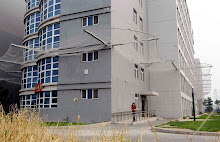The Independent
John Lichfield
Nigel Morris
Plans to build a new generation of "fighter drones" that can wage war by remote control are set to be agreed today by Britain and France. David Cameron and President Nicolas Sarkozy are preparing to put their recent tensions behind them to launch proposals for the pilotless stealth aircraft at a summit in Paris. In a second agreement, they will promise closer co-operation on civil nuclear power.
Western nations increasingly regard the deployment of drones to launch surgical strikes on targets as a way of keeping military casualties to a minimum.
Several senior al-Qa'ida figures have been killed by unmanned American drones flying over Pakistan, while British drone missions could begin within months over Afghanistan. Critics claim the aircraft can cause "collateral damage" among civilians and that the low risk to service personnel from their use can encourage countries to turn to military force rather than diplomacy.
But the two leaders are preparing to put any qualms to one side as they sign a letter of intent of cross-Channel cooperation on the project.
Under the plan, Britain's BAE and the French planemaker Dassault – rivals in the battle for sales of the present generation of fighter planes – will be asked to collaborate in the creation of a prototype of a Star Wars-type, ground-controlled "fighter drone" by 2020. Mr Cameron and Mr Sarkozy are expected to present the project as proof of continuing – or revived – Anglo-French friendship despite last year's rift over tighter fiscal discipline in the eurozone.
The Paris summit, delayed from last November, will be the first lengthy one-on-one meeting between the two leaders since Mr Cameron vetoed an EU-wide fiscal pact in early December.
Mr Cameron will be accompanied by Nick Clegg, the Deputy Prime Minister, William Hague, the Foreign Secretary, Philip Hammond, the Defence Secretary, and Ed Davey, the Energy Secretary. The two governments will sign a declaration signalling their commitment to nuclear power as a source of safe and affordable energy that will also help cut carbon emissions.
Under the agreement, British and French public and private sector bodies in the civil nuclear power industry will work more closely on education and training, research and development and security. The two sets of ministers will also discuss cooperation in transport. Mr Cameron last night stressed the "strength and depth of Britain's ties with France". He said: "Our commercial relationship is deep and growing with exports increasing and French investment sustaining almost 10,000 jobs in the UK. Our militaries are working together on cutting-edge military technology. This relationship is vital for the national security and the prosperity of both Britain and France."
The Franco-British "fighter drone" would take aerial combat into a new age, replacing all the "conventional" piloted fighter-planes now on offer. The two governments are thought to be ready to put a modest amount of public cash into the project at this stage.
The possibility of French and British co-operation on a drone aircraft – or Unmanned Aerial Vehicle (UAV) – was first mentioned in November 2010 when Mr Cameron and Mr Sarkozy signed a defence treaty committing the two countries to co-operate in military deployment and research. French sources said yesterday that German or Italian, or wider European, participation in the project would be welcomed. But the newspaper Les Echos reported yesterday the letter of intent to be signed by Mr Sarkozy and Mr Cameron was intended as a signal that the project would be under Anglo-French leadership.
American-made drones, sometimes controlled from thousands of miles away, are in service in Afghanistan for surveillance or to attack difficult ground targets. The proposed Anglo-French drones would take the concept a stage further – and into uncharted technological, strategic and moral territory.
The intention is to have a prototype flying by 2020 but it might take many more years before a computer-controlled fighter started service in the RAF or with the French air force.
Sources in Paris told Reuters that the summit would today announce the "next steps and intentions" for "a UAV design and development programme" and an "unmanned combat air system demonstrator programme".
Unmanned aircraft: Britain's fleet
Britain operates a fleet of six Reaper MQ-9 drones, and is spending £135m to expand it to 10 aircraft. They are operational over Afghanistan and last year fired their weapons for the 200th time. The drones are operated by 39 Squadron from a base in Nevada, but this year it is intended they will be controlled from RAF Waddington, Lincolnshire.
Reaper-MQ unmanned aircraft are US-made and can carry up to 14 Hellfire missiles, cruise at a speed of 170kts, and remain aloft for 14 hours.
A UK drone under development has the potential to stay in the air indefinitely. QinetiQ's solar-powered Zephyr can reach altitudes of 70,000ft and in 2010 set a world flight record of more than 14 days.
John Lichfield
Nigel Morris
Plans to build a new generation of "fighter drones" that can wage war by remote control are set to be agreed today by Britain and France. David Cameron and President Nicolas Sarkozy are preparing to put their recent tensions behind them to launch proposals for the pilotless stealth aircraft at a summit in Paris. In a second agreement, they will promise closer co-operation on civil nuclear power.
Western nations increasingly regard the deployment of drones to launch surgical strikes on targets as a way of keeping military casualties to a minimum.
Several senior al-Qa'ida figures have been killed by unmanned American drones flying over Pakistan, while British drone missions could begin within months over Afghanistan. Critics claim the aircraft can cause "collateral damage" among civilians and that the low risk to service personnel from their use can encourage countries to turn to military force rather than diplomacy.
But the two leaders are preparing to put any qualms to one side as they sign a letter of intent of cross-Channel cooperation on the project.
Under the plan, Britain's BAE and the French planemaker Dassault – rivals in the battle for sales of the present generation of fighter planes – will be asked to collaborate in the creation of a prototype of a Star Wars-type, ground-controlled "fighter drone" by 2020. Mr Cameron and Mr Sarkozy are expected to present the project as proof of continuing – or revived – Anglo-French friendship despite last year's rift over tighter fiscal discipline in the eurozone.
The Paris summit, delayed from last November, will be the first lengthy one-on-one meeting between the two leaders since Mr Cameron vetoed an EU-wide fiscal pact in early December.
Mr Cameron will be accompanied by Nick Clegg, the Deputy Prime Minister, William Hague, the Foreign Secretary, Philip Hammond, the Defence Secretary, and Ed Davey, the Energy Secretary. The two governments will sign a declaration signalling their commitment to nuclear power as a source of safe and affordable energy that will also help cut carbon emissions.
Under the agreement, British and French public and private sector bodies in the civil nuclear power industry will work more closely on education and training, research and development and security. The two sets of ministers will also discuss cooperation in transport. Mr Cameron last night stressed the "strength and depth of Britain's ties with France". He said: "Our commercial relationship is deep and growing with exports increasing and French investment sustaining almost 10,000 jobs in the UK. Our militaries are working together on cutting-edge military technology. This relationship is vital for the national security and the prosperity of both Britain and France."
The Franco-British "fighter drone" would take aerial combat into a new age, replacing all the "conventional" piloted fighter-planes now on offer. The two governments are thought to be ready to put a modest amount of public cash into the project at this stage.
The possibility of French and British co-operation on a drone aircraft – or Unmanned Aerial Vehicle (UAV) – was first mentioned in November 2010 when Mr Cameron and Mr Sarkozy signed a defence treaty committing the two countries to co-operate in military deployment and research. French sources said yesterday that German or Italian, or wider European, participation in the project would be welcomed. But the newspaper Les Echos reported yesterday the letter of intent to be signed by Mr Sarkozy and Mr Cameron was intended as a signal that the project would be under Anglo-French leadership.
American-made drones, sometimes controlled from thousands of miles away, are in service in Afghanistan for surveillance or to attack difficult ground targets. The proposed Anglo-French drones would take the concept a stage further – and into uncharted technological, strategic and moral territory.
The intention is to have a prototype flying by 2020 but it might take many more years before a computer-controlled fighter started service in the RAF or with the French air force.
Sources in Paris told Reuters that the summit would today announce the "next steps and intentions" for "a UAV design and development programme" and an "unmanned combat air system demonstrator programme".
Unmanned aircraft: Britain's fleet
Britain operates a fleet of six Reaper MQ-9 drones, and is spending £135m to expand it to 10 aircraft. They are operational over Afghanistan and last year fired their weapons for the 200th time. The drones are operated by 39 Squadron from a base in Nevada, but this year it is intended they will be controlled from RAF Waddington, Lincolnshire.
Reaper-MQ unmanned aircraft are US-made and can carry up to 14 Hellfire missiles, cruise at a speed of 170kts, and remain aloft for 14 hours.
A UK drone under development has the potential to stay in the air indefinitely. QinetiQ's solar-powered Zephyr can reach altitudes of 70,000ft and in 2010 set a world flight record of more than 14 days.































No comments:
Post a Comment